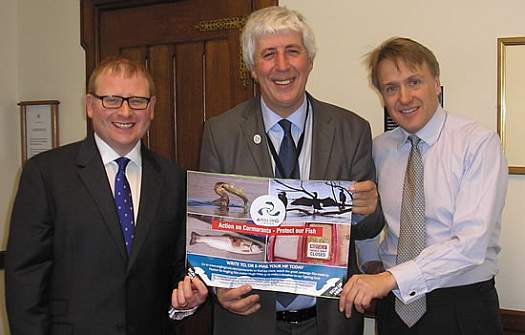The Angling Trust has taken the case for tougher controls on cormorant numbers to Parliament with a special briefing for MPs from the All Party Angling Group on their recently published 10,000 word report highlighting the damage done to fisheries and wild fish stocks in the UK as a result of a fifteen fold increase in cormorant numbers over the last 25 years.
The MPs were shown case studies from across the country where predation from both cormorants and goosanders had destroyed once thriving fisheries. They were shown technical data from recent Environment Agency surveys of declining fish stocks in a number of key catchments including the once prolific Hampshire Avon and alarming evidence on the impact of cormorants on the endangered eel population as a result of unsustainable avian predation.
The MPs, who were briefed by Angling Trust campaigns chief Martin Salter, have pledged to contact Fisheries Minister Richard Benyon to press the case for angling clubs and fishery managers to be able to better protect vulnerable fish stocks.
Photo shows Martin Salter with MPs Charles Walker (Broxbourne) and Marcus Jones (Nuneaton ) in the House of Commons in support of the Angling Trust’s Action on Cormorants campaign

Martin Salter with MPs Charles Walker (Broxbourne) and Marcus Jones (Nuneaton ) in the House of Commons in support of the Angling Trust’s Action on Cormorants campaign
Mr Benyon is shortly to receive the recommendations of a special DEFRA review group on the impact of fish eating birds which are expected to include proposals to reduce the current restrictions on cormorant licensing by Natural England. At the moment applicants have to go through a complicated and bureaucratic procedure that often results in a wholly inadequate outcome providing little protection for the fishery and is expensive for the taxpayer and rural businesses.
Martin Salter said:
“We are heartened and encouraged by the support we have received from MPs of all parties and are very pleased that Richard Benyon, and his team at Defra, has taken such a close and careful look at how best to protect the nation’s freshwater fisheries from unsustainable predation. We are hopeful of a positive outcome for Britain’s three million anglers and for the fish and fisheries upon which our sport depends.”
He added:
“Well balanced ecosystems need a healthy balance between predator and prey and we need action now to restore that vital balance and give our fish a chance. Whatever the outcome of the review the Angling Trust will work with our members clubs to ensure that the government’s chosen option is implemented responsibly and proportionately.”
Report Highlights:
- The Angling Trust has been campaigning for nearly 3 years to change the licensing regime for the control of cormorants and goosanders. As part of this process, anglers have recorded nearly 70,000 sightings of these birds throughout the country in the past year at www.cormorantwatch.org
- Cormorant numbers have increased since protection was introduced in 1981 via the European Wild Birds Directive. Numbers of over wintering birds, which traditionally were around 2,000 in the sixties and seventies, rose dramatically to 14,554 in 1987/8 and to a peak of 30,188 in the winter of 2003/4 – a doubling of numbers in 6 years and a staggering 15 fold increase in just over 20 years.
- The Environment Agency’s Eel Management Plans submitted to the European Commission under the Eel Regulation has made eels the most protected fish in Europe due to the collapse of their population numbers, yet the plan estimates of the number of eels consumed by cormorants in inland and estuarine waters in England and Wales to be between 29-43 tonnes.
- The number of over-wintering cormorants is currently estimated at 23,000. Each individual bird eats at least one pound of fish every day, which equates to 2,760,000lb of fish lost each winter.
- Numbers have increased by the influx of the migrant European sub-species Phalacrocorax carbo sinensis from mainland Europe.
- The biodiversity of our rivers and still waters is at serious risk from excessive predation from cormorants and goosanders whose numbers have exploded in the last two decades to unsustainable levels.
- Rivers and waterways are failing under the Water Framework Directive and of those failing more than 50% do so due to poor fish stocks. The Angling Trust and Fish Legal are pressing for concerted action on abstraction, pollution and habitat damage, but fish stocks need urgent protection NOW from predation.
- Cormorants and goosanders inflict serious injuries on fish too big for them to eat leaving them vulnerable to disease and death.
- Action is needed now to allow angling clubs and fishery owners to protect their fisheries better and there is a strong case for cormorants to be placed on the general licence giving them the same status as rooks, jays and magpies.








